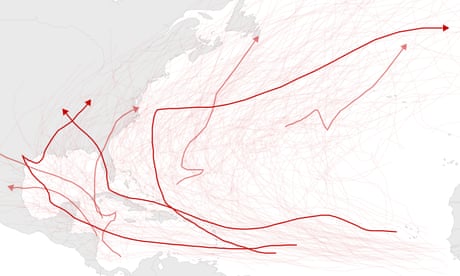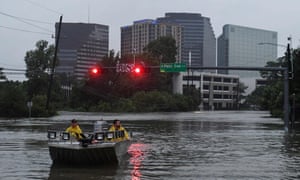
At least 67bn of the damage caused by Hurricane Harvey in 2017 can be attributed directly to climate breakdown according to research that could lead to a radical reassessment of the costs of damage from extreme weather.
Harvey ripped through the Caribbean and the US states of Texas and Louisiana causing at least 90bn of damage to property and livelihoods and killing scores of people.
Exclusive: new figure far higher than previous estimates of direct impact of global heating
Flooding in Houston, Texas, after Hurricane Harvey in 2017. Photograph: Mark Ralston/AFP/Getty
At least $67bn of the damage caused by Hurricane Harvey in 2017 can be attributed directly to climate breakdown, according to research that could lead to a radical reassessment of the costs of damage from extreme weather.
Harvey ripped through the Caribbean and the US states of Texas and Louisiana, causing at least $90bn of damage to property and livelihoods, and killing scores of people.
Conventional economic estimates attributed only about $20bn of the destruction to the direct impacts of global heating. Climate breakdown is known to be making hurricanes stronger and may make them more likely to occur, but separating the effects of global heating from the natural weather conditions that also cause hurricanes is complex.
In a study published in the journal Climatic Change, researchers used the emerging science of climate change attribution to calculate the odds of such a hurricane happening naturally or under increased carbon dioxide levels, and applied the results to the damage caused.
Similar methods were used in a separate study, published last month in the same journal, that found that droughts in New Zealand between 2007 and 2017 cost the economy about NZ$4.8bn, of which $800m was directly linked to climate change. Floods caused insured losses of about NZ$470m over the same period, of which NZ$140m was linked to the climate.
The researchers say the new tools are a more accurate way of estimating the economic damage caused by climate breakdown.

Is climate change making hurricanes worse?
Read more
“We’re pretty sure the climate change-related damages associated with extreme events have been underestimated in most assessments of the social cost of carbon,”said David Frame, a professor of climate change at the Victoria University of Wellington and the lead author of the studies. “We think this line of research, as it matures, should provide a really valuable input.”
Friederike Otto, the director of the Environmental Change Institute at Oxford, who was not involved in the research, said the method could make it possible to generate global estimates of the true cost of climate breakdown, which could have a profound effect on how governments and businesses approach the need to reduce greenhouse gas emissions.
“We have known about the costs of climate change theoretically,”said Otto. “It’s all very well in the abstract, but the global mean temperature does not kill anyone –extreme events cost money and lives. Being able to attribute these impacts to climate change means being able to convey what climate change really means.”
She said it would become possible to compile an inventory of the damage that could be attributed to climate change around the world, which governments and businesses could use to bring about change. “Hopefully this will speed up the process of moving to net zero [carbon].”
Estimating the true costs of the climate crisis could also help developing countries seeking recognition of the loss and damage they face as a result of climate breakdown, which they argue should spur rich countries to provide more assistance. Loss and damage is likely to be one of the most vexed issues at next year’s UN Cop26 climate summit.
Legal actions around the world would also be affected, said Tessa Khan, a co-director of the Climate Litigation Network. Activists and local governments around the world are taking fossil fuel companies to court over their greenhouse gas emissions, arguing that they knowingly caused damage while profiting from raising carbon dioxide levels.
“[The two new studies] are opening to door to stronger evidence to persuade courts that fossil fuel companies should be held accountable for their role,”Khan said. “This will strengthen the legal basis of these lawsuits.”
We’ve never had a better chance …
…to make a greener world. Covid-19 has delivered unusual environmental benefits: cleaner air, lower carbon emissions, a respite for wildlife. Now the big question is whether we can capitalise on this moment. The Guardian aims to lead the debate from the front.
In the weeks and months ahead, our journalism will investigate the prospects for a new green settlement. We will showcase the big thinkers and protagonists and amplify the arguments for authorities everywhere to consider as they lead us out of coronavirus.
Our credentials suit us well to the task: we are independent, we have no owners, no paymasters or oligarchs pulling the strings. We have committed to carbon neutrality, divested from the oil and gas sectors and renounced fossil fuel advertising. But at this crucial moment, news organisations like ours are facing a daunting financial challenge. As businesses everywhere feel the pinch, the advertising revenue that has long helped to sustain our work has plummeted. We need you to help fill the gap.
Our journalism is open to all because we believe everyone deserves access to factual information, regardless of where they live or what they can afford to pay. If you can afford to, we hope you will consider supporting our journalism today.
The Guardian believes that the climate crisis we face is systemic. We will inform our readers about threats to the environment based on scientific facts, not driven by commercial or political interests. We will keep reporting on the efforts of individuals and communities around the world who are fearlessly taking a stand for future generations and the preservation of human life on earth. We want their stories to inspire hope.
We need your support to keep delivering this kind of open, committed independent journalism. Every reader contribution, however big or small, is so valuable. Support the Guardian from as little as $1 –and it only takes a minute. Thank you.
موضوعات مشابه:


